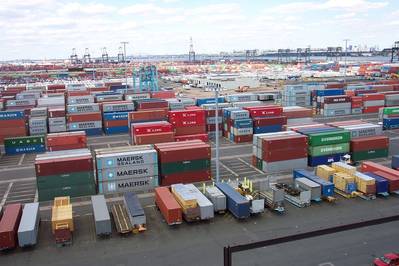Shipping Containers Have Never Been Cooler
Shipping containers are ready for their close up.
Long the invisible building blocks of the global economy, shipping containers are having their moment. Entrepreneurs and developers are utilizing them on land, in full view of the public that depended on them for delivering, well, everything since they were widely adopted by shipping carriers in the late 60's. The containers are being used to build housing, shopping centers, medical facilities and even farms.
NPR reported yesterday on a Boston-based company called "Freight Farms," which uses modified shipping containers to grow plants and vegetables year-round.
"The shipping containers are insulated, and all the systems -- from pumps to irrigation to LED growing lights -- can be digitally controlled," NPR reports. "The Freight Farms are also Wi-Fi hot spots, so farmers can check on things like pH levels remotely using a mobile dashboard."
Growing crops in shipping containers seems a natural extension of what shipping containers already do quite often: transport vegetables. Vegetables don't require the space or comforts that, say, a person would. But that hasn't stopped Wagamon Enterprises in Huntsville, Texas from creating student housing out of stacked, multi-colored shipping containers, the Huntsville Item reported last week. The shipping containers will house 540-square foot apartments with "appliances, granite countertops, and industrial-looking fixtures."
"The whole idea behind doing them in shipping containers is just because it's cool," general contractor Jack Wagamon told the Item. "It's student housing so we want to make it look cool. Kids like that kind of thing."
In Honolulu, a local charity isn't trying to sell kids on the coolness of living in shipping containers, but instead trying to sell local government on using containers to shelter the homeless. Faith Action for Community Equity (FACE) set up a 20x8 foot shipping container that can house a family of five. KITV in Honolulu reported earlier this month that the dwelling was built for only $11,000 and included four beds, a desk, and electricity.
"It doesn't have any bathrooms or a kitchen," Catherine Graham, co-chair of FACE's Housing Task Force told KITV "but it's better than a tent or a family living in a car."
In Albuquerque, NM, a retail center called Green Jeans is being built by converting shipping containers into office spaces and open-air patios. Roy Solomon, the developer of Green Jeans, told Albuquerque's KOAT that he's already signed his first tenant, Santa Fe Brewing company, which will open a tap room and beer garden amid the stacks of shipping containers that will form the center, which should be open by Memorial Day.
But perhaps the most inspiring story from the shipping container repurposing movement are the efforts of Dr. Shamrila Anandasabapathy and her team at the Baylor College of Medicine. They were awarded a preliminary grant of $850,000 from the U.S. Agency of International Development earlier this month for their Emergency Smart Pod, an eight-bed medical unit built inside of a recycled shipping container.
The pods could be dropped by helicopter into areas hit by natural disasters or epidemics. They also cost less than 5% of a brick and mortar medical unit and allow for rapid worldwide deployment.
"Getting medical care to those areas and developing capacity there is a huge issue," Dr. Anandasabapathy told U.S. News & World Report. "You have to be quick and fast."
Shipping containers are increasingly easy to find in the U.S., since China sends so many here and comparatively few are sent overseas. And they're cheap: a single box can sell for just a few thousand dollars. Get ready to see more and more shipping containers in cities and towns, and not just on docks and ships. You might even be living in one.












